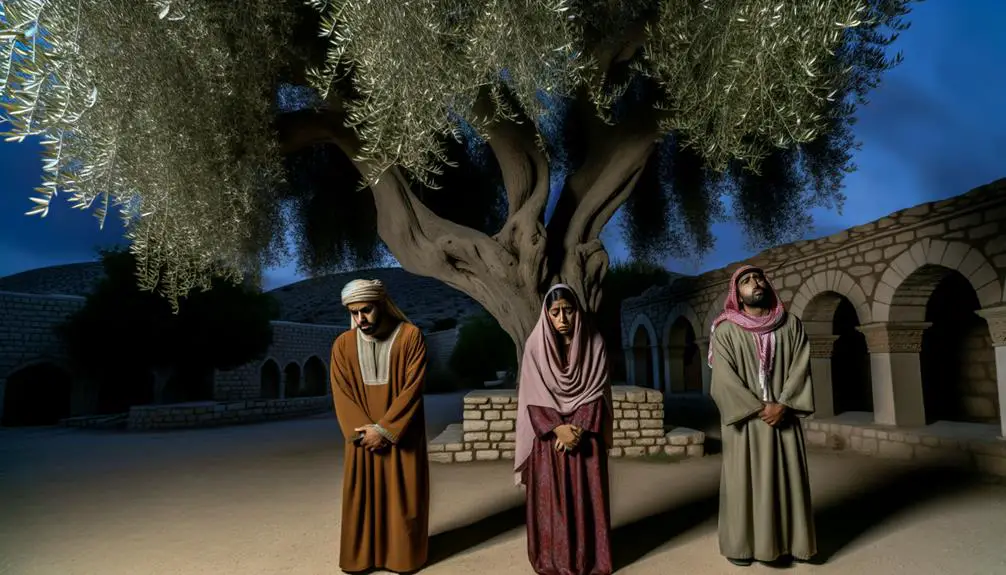The Bible's laments reveal deep spiritual struggles and quests for divine understanding—discover their profound impact on faith and resilience.

Examples of Lament in the Bible
In the Bible, you encounter various expressions of lament, each providing insightful reflections on human and divine interaction. Characters like Job agonize over personal suffering, voicing despair while wrestling with the justification of righteousness amid calamity. David's psalms, conversely, intersperse lament with hopes, spotlighting an enduring faith during spiritual struggles. Jeremiah projects a communal lament for Jerusalem, articulating national tragedy framed by sin and hope for salvation. Each narrative serves to deepen your understanding of theological and existential interrogatives entwined in these sacred texts, beckoning further exploration into their layers of meaning and implication.
Key Takeaways
- Job's pleas illustrate individual human suffering and a quest for understanding amidst adversity.
- David's psalms express deep personal grief and ongoing spiritual dialogue with God.
- Jeremiah's lamentations reflect national despair and theological contemplation on sin and redemption.
- Jonah's prayer from inside the fish symbolizes repentance and acknowledges God's overruling power.
- Jesus' tears over Jerusalem combine prophetic insight with profound empathy for the city's future.
Job's Desperate Pleas

In the Book of Job, you'll find that Job's desperate pleas for understanding and relief from his immense suffering serve as a profound exploration of human anguish and the quest for divine intervention. These laments are not merely cries of pain; they are also pivotal in discussing the purpose of suffering and the nature of righteousness. Job's integrity, starkly highlighted against his calamities, underscores a central theme: the seemingly paradoxical relationship between righteousness and suffering.
You might notice, as you dig deeper, that the narrative structure of Job does not straightforwardly endorse a retributive justice system where good is always rewarded, and evil punished. Instead, it challenges you to reconsider the simplistic equation of suffering with divine displeasure. Job maintains his integrity despite losing everything, fervently asserting his innocence while grappling with the silence and, at times, the seemingly dismissive responses of God to his plight.
This intricate portrayal invites you to reflect on the purpose of suffering. It suggests that suffering can be a crucible for spiritual refinement, rather than a straightforward indicator of divine judgment. Through Job's story, you're encouraged to explore a more nuanced understanding of human suffering, one that transcends mere retribution and explores the aspects of spiritual growth and existential testing.
David's Mourning Psalms
David's mourning psalms poignantly express his profound grief and the complexity of his relationship with God. These texts are pivotal in understanding the King's emotional authenticity and spiritual struggles. As you explore Psalms like Psalm 6 or Psalm 22, you're confronted with David's raw emotional states—ranging from despair to a plea for deliverance. These psalms aren't just about personal sorrow; they encapsulate a dialogue with the Divine, where David questions, yet ultimately reaffirms his faith.
In analyzing these lamentations, it's important to recognize the layers of context in which they were composed. Remember, David wasn't only a king but also a warrior, a leader under constant pressure and threat. His psalms reflect not just personal grief but also a communal lament for his people's suffering and the burdens of leadership. This dual aspect enriches the texts, providing a broader canvas of interpretation.
Moreover, the structure and language of these psalms highlight David's spiritual journey. Through metaphor and poignant imagery, he crafts a narrative of vulnerability that resonates with anyone who's experienced loss or despair. Ultimately, these psalms teach you about resilience and the power of maintaining a dialogue with God, even when engulfed in the shadows of distress.
Lamentations of Jeremiah

While David's psalms offer a personal perspective on lament, the book of Lamentations presents Jeremiah's profound expression of communal sorrow and despair following Jerusalem's destruction. Here, you explore a shift from individual grief to a national tragedy, as articulated through Jeremiah's prophecies. The text encapsulates the intense suffering and the profound sense of loss felt by the entire nation, turning personal lament into a mirror of national sorrow.
Delving deeper, Lamentations isn't just a recount of woes but a theological reflection on sin, punishment, and the hope for eventual renewal. You see, Jeremiah doesn't merely document the events; he interprets them through a prophetic lens, emphasizing the collective punishment for national sins. This aspect of Jeremiah's writings links the physical destruction of Jerusalem to a spiritual and communal breakdown, making the lament a cornerstone for understanding divine justice and mercy.
As you analyze Lamentations, you're not just reading a historical account; you're engaging with a liturgical text that has shaped the Jewish understanding of suffering and divine sovereignty. The book's structure and poetic form enhance its thematic resonance, turning Jeremiah's observations into a lasting expression of national sorrow and hope for redemption.
Jonah's Prayer From the Fish
How does Jonah's prayer from within the fish serve as a pivotal moment of personal lament and divine intervention in the narrative? When you dive into the text, you'll see that Jonah's prayer from inside the fish isn't just a cry for help but a profound acknowledgment of divine sovereignty and repentance. This prayer marks a turning point where Jonah shifts from running from his divine mission to surrendering to God's will, illustrating a critical intersection of human despair and divine mercy.
The prayer's role in the narrative is multifaceted. It's not only a personal lament but also a catalyst for divine intervention, which ultimately leads to Jonah's deliverance and continuation of his prophetic mission. To understand this better, let's break down key aspects of this episode:
Aspect |
Description |
Significance |
|---|---|---|
Setting |
Jonah is inside the fish, a place of darkness and isolation |
Symbolizes Jonah's despair and isolation |
Prayer Content |
Acknowledgment of God's power, promise to fulfill vows |
Reflects repentance and commitment |
Divine Response |
God commands the fish to release Jonah |
Direct divine intervention |
Outcome |
Jonah goes to Nineveh, fulfilling his divine mission |
Shows the transformation and redemption |
This table highlights how the prayer's role within the narrative isn't just about Jonah's personal struggle but also underscores the broader theme of redemption through divine intervention.
Jesus Weeps Over Jerusalem

In the poignant episode where Jesus weeps over Jerusalem, we witness a profound expression of lament that encapsulates His grief for the city's impending destruction and the people's blindness to their visitation by God. Here, you're seeing a moment of deep prophetic grief, not just for the physical city but for its spiritual state and the destiny that awaits it. This lament is not merely an expression of sorrow but a profound declaration about the consequences of the city's choices and the missed opportunities for redemption.
Jesus' tears over Jerusalem underscore a critical aspect of His ministry—empathy and mourning over the fate of those He came to save. His lamentation goes beyond the immediate emotional response, reflecting His understanding of the city's historical and theological significance. The city that should have been a beacon of faith and hope instead becomes a symbol of resistance and missed divine encounters.
This episode serves as a somber reminder of the weight of prophecy and the pain of foreseeing inevitable destruction. It's a powerful portrayal of the intertwining of divine foresight and human freedom, where the prophetic vision provides not just future insights but also a profound emotional connection to the people involved.
Saul's Regret in Samuel
Saul's profound regret, as depicted in the book of Samuel, marks a pivotal moment in his kingship and reveals the complex dynamics of divine favor and human agency. You can explore how Saul's remorse unfolds in a narrative filled with prophetic warnings and spiritual disobedience. Initially anointed by God, Saul's failure to fully comply with divine commands leads to his personal and the kingdom's decline. His lamentation isn't just about personal loss but is emblematic of a leader who realizes too late the consequences of his actions.
As you investigate further, you'll see that Saul's lament is intricately tied to his realization of being rejected by God as king over Israel. This is poignantly expressed through his interactions with the prophet Samuel, where he pleads for forgiveness, highlighting his internal turmoil and desperation. The text invites you to reflect on the weight of leadership and the dire consequences of deviating from divinely set paths. Saul's story serves as a cautionary tale about the importance of obedience and the heavy burden of divine favor, making his narrative a critical study in the understanding of biblical laments.
Hezekiah's Sickness Lament

While Saul's narrative reflects the consequences of disobedience, another poignant biblical example of lament is found in the story of King Hezekiah's illness. You observe in the Biblical text that as Hezekiah faced the shadow of death, his lament is not just a fear of the end but encapsulates a profound 'Royal anxiety' about the unfinished kingly duties and the vulnerability of his kingdom without his leadership. This anxiety is articulated through his prayers and weeping, illustrating a deeply personal and public crisis intertwined.
Hezekiah's recovery, however, marks a pivotal moment in biblical history. It isn't merely a physical healing, but a restoration of faith and royal authority. The narrative strategically places his recovery as a sign of divine favor, underscoring the belief that God responds to the heartfelt pleas of His people. This incident prompts you to reflect on how personal turmoil and the ensuing lament can lead to a transformative recovery, both spiritually and politically.
The story of Hezekiah serves not only as a record of illness and recovery but also as a theological discourse on the power of prayer, the role of a king, and the impact of divine intervention on royal stability and national morale.
Moses' Cry at Meribah
Amidst the arid wilderness of Meribah, Moses' cry to the Lord reflects a pivotal moment of both desperation and leadership crisis. As you explore this narrative, you'll observe how water scarcity not only precipitates a physical drought but also intensifies the spiritual and leadership burdens that Moses bears. This moment is not merely about a lack of water, but about the weight of expectation and the challenge of sustaining faith in dire circumstances.
In this scene, Moses faces the murmuring of Israel, a community distraught and distressed by their harsh conditions. The pressure mounts, not just to find a solution to the physical thirst, but to address the growing doubt among the people regarding their leadership and divine protection. Here, Moses' lament is multifaceted—it's a plea for help, an expression of frustration, and a critical interrogation of his role. “What shall I do with this people?” he asks, encapsulating the enormity of his leadership burden in a single, desperate inquiry.
This episode at Meribah serves as a stark tableau of the challenges inherent in leadership during times of crisis. It prompts you to reflect on how leaders negotiate the fine balance between meeting immediate needs and maintaining long-term vision and faith.
Frequently Asked Questions
How Do Laments Differ Between the Old and New Testaments?
You'll notice Covenant comparisons reveal that Old Covenant laments often involve communal suffering, while New Covenant expressions are more about personal or redemptive sorrow, reflecting a shift in emotional expressions across the scriptures.
Are There Any Female Voices of Lamentation in the Bible?
Yes, you'll find female expressions of lamentation in the Bible. Particularly, Hannah's prayer (1 Samuel 1:10) and the daughters of Jerusalem in Lamentations beautifully illustrate women's significant roles in biblical mourning.
What Role Do Laments Play in Modern Religious Practices?
In modern religious practices, laments facilitate personal healing and strengthen community bonding. They allow you to express grief collectively, fostering a shared understanding and resilience within your spiritual community.
How Is Lament Used as a Form of Protest or Resistance?
Lament, as a form of protest, uses symbolism and emotional defiance to express dissent. Over 60% of protest songs incorporate lamentation, showcasing its power to resist and challenge societal norms analytically and contextually.
Can Lament Be Found in Other Religious Texts Outside the Bible?
Yes, you'll find lament in other religious texts. A comparative analysis reveals that these cultural expressions serve similar purposes, highlighting universal themes of grief and resilience across different spiritual and historical contexts.



Sign up